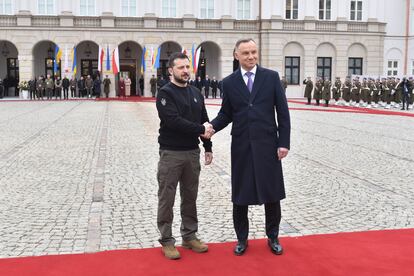EU grain crisis opens cracks in unconditional support for Ukraine in eastern Europe
Poland is leading an initiative to limit the economic impact on the EU’s eastern bloc of the go-ahead for the import of duty-free agricultural products from Kyiv


The first cracks in the unconditional support for Ukraine from the European Union’s eastern bloc of countries are starting to show. Poland, which has been at the forefront of military, logistical and humanitarian aid to Kyiv since the beginning of the Russian invasion in February 2022, has provided an eloquent signal that its support has limitations in one key area: economics. By vetoing the entry of duty-free Ukrainian grain into the country, the ultra-conservative, nationalist Law and Justice (PiS) government, which goes to the polls this autumn, has shown that support for Ukraine ends where its own interests begin. Hungary and Slovakia have also announced bans on Ukrainian food imports, while Romania and Bulgaria are threatening to follow suit.
Poland’s sudden decision to ban imports of Ukrainian grain and other agricultural products and their transit through the country as of April 15 until June 30 coincides with political campaigning ahead of legislative elections scheduled for this autumn. Polls show that PiS, although still retaining an advantage, is losing ground and may need to seal deals with other parties to govern. Rural areas of Poland, which are most affected by the influx of cheaper grain, are one of its main sources of PiS votes. Demonstrations by farmers in recent weeks had already threatened the mobilization that the ruling party needs to revalidate its hold on power.
Michal Baranowski, director of the U.S.-based German Marshall Fund think tank, also points to the electioneering character of the measure ahead of a ballot that is expected to be decided by fine margins. “This move is strongly motivated by internal reasons,” Baranowski told EL PAÍS in a telephone conversation. “Farmers are a very important bloc for PiS, and they are furious.”
After Russia’s invasion of Ukraine, it became too dangerous for ships to traverse the Black Sea, disrupting the flow of large container vessels carrying food to distant markets. Shipments resumed under a deal brokered by the United Nations and Turkey.
The EU, meanwhile, reacted to the crisis by lifting tariffs and other trade duties on Ukraine to help keep its economy afloat. That helped to divert Ukraine’s grain flows destined for Africa and the Middle East through Europe — but much of this food has instead remained in the bordering countries, creating a glut that has caused high losses for local farmers.
Baranowski added that “the grain issue is starting to highlight something that had not been in the public debate until now,” referring to dissatisfaction among some sectors of the population over the government’s unwavering support for Ukraine, which he attributes to the rise of Konfederacja (Confederation Liberty and Independence), a far-right political alliance “that has openly defended anti-Ukrainian positions.” Some polls give Konfederacja slightly over 10% of support, which could make it key to the formation of a future government.
The first indications that the Polish government was willing to modulate its policies of support for Ukraine came a few months ago when it was announced that it would start charging to cover part of the accommodation provided for Ukrainian refugees staying in public refuges for over four months. The measure, which included broad exceptions, came into effect on March 1 but only applied to a very small percentage of the more than 1.3 million Ukrainian refugees in Poland. However, the decision sent a message to a section of Polish society that was starting to question whether refugees were being treated better than they were. Housing, which is increasingly expensive in a country where inflation stood at 16.1% in March, may become another contentious point between Poles and Ukrainian refugees. Baranowski also points to possible competition on the lower rungs of the labor market, which is generally a strong and where unemployment is at 5.5%. Despite these societal concerns, military support for Ukraine is widely supported by Polish citizens and the political class.
Kyiv caught off guard by Warsaw
The decision to veto Ukrainian grain took everyone by surprise, especially Kyiv, which was negotiating the issue with Warsaw. Polish daily Gazeta Wyborcza claimed that not even the president, Andrzej Duda, was aware of the measure, and noted that Poland was very active in promoting the 2022 agreement to facilitate Ukraine’s trade with the EU, despite Polish farmers voicing their discontent and critics accusing the government of looking the other way.
The response among neighboring countries to the decision in Poland, which has been the de facto leader in the EU eastern bloc since the Russian invasion, was swift: Hungary announced a similar move on Saturday. “This is the first time in more than a year that the two countries have found some common ground in relation to Ukraine; it is surprising and not good,” notes Baranowski. On Monday, Slovakia, which had already expressed concern about the use of EU-prohibited pesticides on Ukrainian agricultural products, decided to ban imports as well, although it will allow transit through its territory to other countries. Bulgaria and Romania have announced that they are considering similar measures.
The Polish government justifies what Baranowski terms the “nuclear option” by the absence of a response from the European Commission to a joint letter issued by the prime ministers of the five countries, including Poland’s Mateusz Morawiecki. In a radio interview Monday, Pawel Jablonski, Poland’s deputy foreign minister, pointed to “a provision [in European regulations] that states in emergency situations member states can introduce restrictions motivated, for example, by public health issues.” The European Commission responded on Monday by noting that responsibility for decisions on trade in the bloc lies exclusively with Brussels.
Paul Dunay, professor of international relations at the Eötvös Loránd University in Budapest, believes that the Ukraine’s neighbors are staging “a collective rebellion” over a crisis to which the European Commission will have to find a solution. “Either ban imports that destabilize domestic markets, or allow imports but with compensation from the European Union to these countries for their losses,” he says. Brussels has so far released $61 million to Poland, Romania and Bulgaria, but this is considered insufficient. “Nobody wants to inconvenience our Ukrainian friends,” Dunay points out, adding that Kyiv should be “more innovative” in its search for new markets and that “in the name of the Common Agricultural Policy, the European Commission must take steps.”
While the Polish and Ukrainian agriculture ministers met in Warsaw on Monday to seek an avenue out of the crisis, PiS leader Jaroslaw Kaczynski attempted to cushion the blow on Saturday when announcing the measure. “We are and will remain, without the slightest change, friends and allies of Ukraine and will continue to support it,” he insisted. However, Kaczynski made it clear that support has limits: “We have to defend Polish agriculture.”
Sign up for our weekly newsletter to get more English-language news coverage from EL PAÍS USA Edition
Tu suscripción se está usando en otro dispositivo
¿Quieres añadir otro usuario a tu suscripción?
Si continúas leyendo en este dispositivo, no se podrá leer en el otro.
FlechaTu suscripción se está usando en otro dispositivo y solo puedes acceder a EL PAÍS desde un dispositivo a la vez.
Si quieres compartir tu cuenta, cambia tu suscripción a la modalidad Premium, así podrás añadir otro usuario. Cada uno accederá con su propia cuenta de email, lo que os permitirá personalizar vuestra experiencia en EL PAÍS.
¿Tienes una suscripción de empresa? Accede aquí para contratar más cuentas.
En el caso de no saber quién está usando tu cuenta, te recomendamos cambiar tu contraseña aquí.
Si decides continuar compartiendo tu cuenta, este mensaje se mostrará en tu dispositivo y en el de la otra persona que está usando tu cuenta de forma indefinida, afectando a tu experiencia de lectura. Puedes consultar aquí los términos y condiciones de la suscripción digital.








































